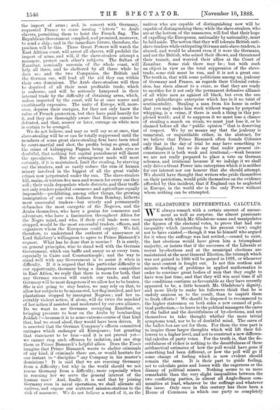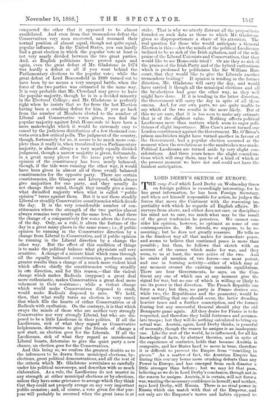MR. GLADSTONE'S DIFFERENTIAL CALCULUS.
WE always remark with a certain amount of amuse- ment as well as surprise, the almost passionate eagerness with which Mr. Gladstone scans and manipulates the figures of the electoral votes, to prove that had one inequality which (according to his present view) ought not to have existed,—though it was he himself who argued for it when the suffrage was last settled,—ceased to exist, the last elections would have given him a triumphant majority, or insists that if the successes of the Liberals at recent by-elections and at the municipal elections are maintained at the next General Election, the triumph which was not gained in 1886 will be gained in 1891, or whenever the next contest is fought out. Is not this restless and minute working of problems in applied mathematics in order to convince great bodies of men that they ought to have won last time, and that they will win next time if all the conditions continue as favourable as they have recently appeared to be, a little beneath Mr. Gla,dstone's dignity, and more likely to make his followers think that he is unduly anxious as to the result, than to inspirit them to fresh efforts ? We should be disposed to recommend to the higher statesmen on both sides a new counsel of poli- tical perfection,—to leave to the political managers the cares of the ballot and the deceitfulness of by-elections, and not themselves to take thought whither the more trivial symptoms tend, nor to be of doubtful mind. The cares of the ballot-box are not for them. For them the true part is to inspire those larger thoughts which will lift their fol- lowers to a higher level, and not to construct a new differen- tial calculus of party votes. For the truth is, that the de- ceitfulness of riches is nothing to the deceitfulness of these arithmetical estimates of how the poll would have gone if something had been different, or how the poll will go if some change of feeling which is now evident should remain the same. It is their part to guide feeling, not to calculate gains and losses with the eagerness or the dismay of political misers. Nothing seems to us more remarkable than the very slight inequalities between the two conflicting parties, in almost all Anglo-Saxon com- munities at least, whatever be the suffrage and whatever the issue. Only once in this century has there been a House of Commons in which one party so completely conquered the other that it appeared to be almost annihilated. And even from that tremendous defeat the Conservatives very soon recovered, and resumed their normal position of almost equal, though not quite equal, popular influence. In the -United States, you can hardly find a great election in which the popular vote at least is not very nearly divided between the two great parties. And, as English politicians have proved again and again, even the great defeat of Mr. Gladstone in 1874 was hardly a defeat at all if you went behind the Parliamentary elections to the popular vote ; while the great defeat of Lord Beaconsfield in 1880 turned out to have been by no means a very unequal battle, when the force of the two parties was estimated in the same way. It is very probable that Mr. Cleveland may prove to have the popular majority, though he is in a decided minority in the Electoral College ; and Mr. Gladstone is perfectly right when he insists that so far from the last Election having been a crushing defeat for him, if you go back from the number of Members elected to the number of Liberal and Conservative votes given, you find the popular majority against Irish Home-rule to have been a mere makeweight which it would be extremely easy to cancel by the judicious distribution of a few thousand con- verts over a few critical polls. The judgment of the country, • though, fortunately for us, it seems to be much more com- plete than it really is, when translated into a Parliamentary majority, is almost always a very nearly equally divided judgment, though a narrow majority is given, fortunately, in a great many places for the same party where the opinion of the constituency has been nearly balanced, though, if the tide were running the other way, it would have been given in almost all of these evenly balanced constituencies for the opposite party. There are certain constituencies, like Glasgow and Liverpool, which always give majorities for one party, and they usually do not change their mind, though they usually give a some- what dwindled majority when what is called "public opinion" turns against them. But it is not these steadily Liberal or steadily Conservative constituencies which decide the day. It is the very considerable number of con- stituencies where the strength of the two parties almost always remains very nearly on the same level. A:nd there the change of a comparatively few votes alters the fortune of the day. Only, as a rule, it alters the fortune of the day in a great many places in the same sense ; i.e., if public opinion be running in the Conservative direction by a change from Liberal to Conservative, and if public opinion be running in the Liberal direction by a change the other way. But the effect of this condition of things is to make the political balance what physicists call very sensitive. A change of a minute kind which runs through all the equally balanced constituencies, produces much greater results than a change of a much more violent kind which affects chiefly the constituencies voting steadily in ofie direction, and for this reason,—that the violent change which makes Radicals (suppose) a great deal more enthusiastic, makes Conservatives a great deal more vehement in their resistance ; while a violent change which would make Conservatives disposed to exult, would make Radicals disposed to rave. We hold, then, that what really turns an election is very rarely that which fills the hearts of either Conservatives or of Radicals with exultation. On the contrary, it is that which sways the minds of those who are neither very strongly Conservative nor very strongly Liberal, but who are dis- posed to be a little Laodicean in their politics. If all the Laodiceans, sick of what they regard as Conservative helplessness, qletermine to give the friends of change a new start, an election goes for the Liberals. If all the Laodiceans, sick of what they regard as unredeemed Liberal boasts, determine to give the quiet party a new chance, an election goes for the Conservatives.
And this being so, we confess the greatest doubts as to the inferences to be drawn 'from municipal elections, by- elections, great political demonstrations, and all the rest of the criteria which Mr. Gladstone serntinisep so Carefully under his political microscope, and describes with so 'much elaboration. As a rule, the Laodiceans do not minter in any strength at either municipal elections or by-elections, unless they have some grievance to avenge which they think that they could not properly avenge on any very important public occasion; and, of course, a vote given for that pur- pose will probably be reversed when the great issue is at stake. That is why we utterly distrust all the propositions founded on such data as those to which Mr. Gladstone gives so disproportionate a share of his attention. The real question for those who would anticipate a General Election is this :—Are the minds of the political Laodiceans inclined to be so sick of the Irish agitation, and of the self- praise of the Liberal Unionists and Conservatives, that they would like to see Home-rule tried ? Or are they so sick of the praises of the Irish Party and of the hybrid enthusiasm which is professed by politicians like Sir William Har- court, that they would like to give the Liberals another tremendous beating ? If opinion is tending in the former direction, Mr. Gladstone will carry the day, and would have carried it though all the municipal elections and all the by-elections had gone the other way, as they well might have done. If it is tending in the latter direction, the Government will carry the day in spite of all these omens. And, for our own parts, we are quite unable to say which of the two results is the more likely. But of this we are sure, that it is too soon to make any estimate that is of the slightest value. Nothing affects political Laodiceans more than matters which seem to eager poli- ticians of slight importance. Miss Cass's arrest turned one London constituency against the Government. Mr. O'Brien's prison sandwiches might have turned another in favour of the Government, had a popular election occurred at the moment when the revelation as to the sandwiches was made. Political Laodiceans are turned aside by very slight con- siderations. And three years hence the slight considera- tions which will sway them, may be of a kind of which at the present moment we have not and could not have the faintest anticipation.







































 Previous page
Previous page